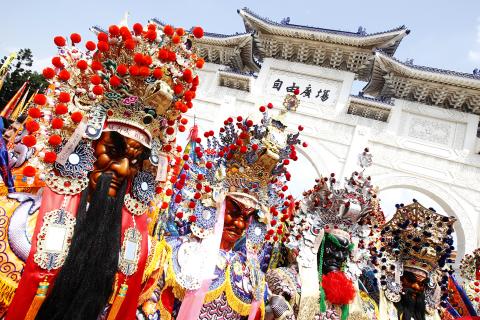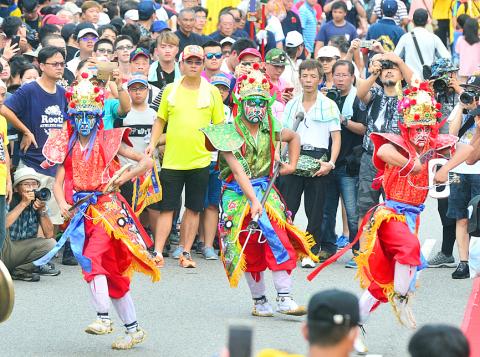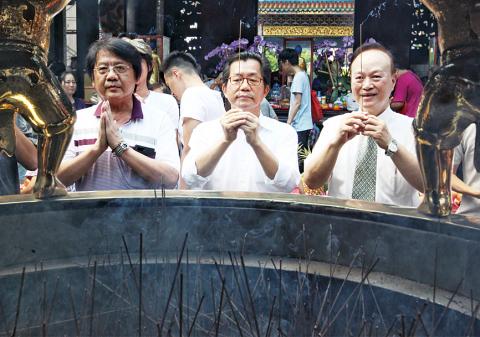Religious troupes with divine palanquins from about 100 temples across the nation yesterday paraded through the streets of Taipei in a rally that was initiated to protest a rumored government policy to ban incense burning, but was later defined as a “religious carnival.”
Rally organizers estimate that about 50,000 people gathered at Liberty Plaza in front of the Chiang Kai-shek Memorial Hall at about 2pm before marching toward Ketagalan Boulevard with “holy generals” and temple staff carrying divine palanquins.
Onlookers lined up along the streets to witness the large number of religious troupes gathered in one event, a rare sight, as they are usually only seen at temples during deity pilgrimages.

Photo: Chiang Ying-ying, AP
Some believers knelt down and waited for Matsu’s palanquin to pass over their heads, a ritual that is said to bring good luck and blessings.
Rally organizer Lin An-le (林安樂), chairman of Wude Temple (武德宮) in Yunlin County’s Beigang Township (北港), said the temples attended the rally not to protest, but to protect religion and the passing down of beliefs.
Temples over the past decade have made efforts to reduce incense burning, he said, adding that after negotiating with the government over the past few days, they made a compromise that “one stick of incense shall be used in each burner, no more.”

Photo: Wang Yi-sung, Taipei Times
The temples also urged the central government to supervise local governments in building specialized incinerators for burning joss paper (commonly known as “ghost money”), to stop them from being gathered and burned along with garbage, Lin said.
The government had never intended to ban incense burning, Democratic Progressive Party Central Executive Committee member Yu Cheng-hsien (余政憲) said at the rally, adding that it would invite temple representatives to discuss regulations regarding the burning of joss paper and lighting of firecrackers, as well as hold public hearings to discuss religious issues.
A rumor had been spreading online that the Environmental Protection Administration (EPA) is not only promoting a reduction in the burning of incense and joss paper, but also plans to impose a ban and gradually phase out the religious practice to improve the nation’s air quality.

Photo: CNA
Wude Temple representatives last month formed the Defending Faith and Incense Alliance and called for other temples to join them at the rally in Taipei.
The alliance at a news conference on July 4 said that the rally would not be a protest against the government, but a religious carnival that would appeal to reason.
“We have never mentioned banning incense burning,” EPA Minister Lee Ying-yuan (李應元) said on Thursday.
The agency respects folk religious rituals and recognizes the temples’ autonomous efforts to reduce incense and joss paper burning, Lee added.
The Cabinet on Thursday also denied the rumor and said it was a misunderstanding.

US President Donald Trump yesterday announced sweeping "reciprocal tariffs" on US trading partners, including a 32 percent tax on goods from Taiwan that is set to take effect on Wednesday. At a Rose Garden event, Trump declared a 10 percent baseline tax on imports from all countries, with the White House saying it would take effect on Saturday. Countries with larger trade surpluses with the US would face higher duties beginning on Wednesday, including Taiwan (32 percent), China (34 percent), Japan (24 percent), South Korea (25 percent), Vietnam (46 percent) and Thailand (36 percent). Canada and Mexico, the two largest US trading

ACTION PLAN: Taiwan would expand procurement from the US and encourage more companies to invest in the US to deepen bilateral cooperation, Lai said The government would not impose reciprocal tariffs in retaliation against US levies, President William Lai (賴清德) said yesterday, as he announced five strategies to address the issue, including pledging to increase Taiwanese companies’ investments in the US. Lai has in the past few days met with administrative and national security officials, as well as representatives from various industries, to explore countermeasures after US President Donald Trump on Wednesday last week announced a 32 percent duty on Taiwanese imports. In a video released yesterday evening, Lai said that Taiwan would not retaliate against the US with higher tariffs and Taiwanese companies’ commitments to

‘SPECIAL CHANNEL’: Taipei’s most important tasks are to stabilize industries affected by Trump’s trade tariffs and keep negotiations with Washington open, a source said National Security Council Secretary-General Joseph Wu (吳釗燮) arrived in the US for talks with US President Donald Trump’s administration, a source familiar with the matter said on Friday. Wu was leading a delegation for a meeting known as the “special channel,” the Financial Times reported earlier. It marked Trump’s first use of the channel since returning to the White House on Jan. 20. Citing a source familiar with the matter, the Financial Times reported that Minister of Foreign Affairs Lin Chia-lung (林佳龍) was also a part of the delegation. The visit came days after China concluded war games around Taiwan and amid Trump’s

CHIP EXCEPTION: An official said that an exception for Taiwanese semiconductors would have a limited effect, as most are packaged in third nations before being sold The Executive Yuan yesterday decried US President Donald Trump’s 32 percent tariff on Taiwanese goods announced hours earlier as “unfair,” saying it would lodge a representation with Washington. The Cabinet in a statement described the pledged US tariffs, expected to take effect on Wednesday next week, as “deeply unreasonable” and “highly regrettable.” Cabinet spokeswoman Michelle Lee (李慧芝) said that the government would “lodge a solemn representation” with the US Trade Representative and continue negotiating with Washington to “ensure the interests of our nation and industries.” Trump at a news conference in Washington on Wednesday announced a 10 percent baseline tariff on most goods